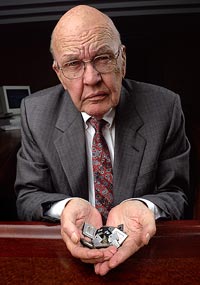A Quote by Johann Johannsson
Cheap electronics are not built to be repaired. They're just used and then discarded.
Related Quotes
We take the traditional value investor's process and just flip it around a little bit. The traditional value investor asks 'Is this cheap?' and then 'Why is it cheap?' We start by identifying a reason something might be mispriced, and then if we find a reason why something is likely mispriced, then we make a determination whether it's cheap.
We are entering a hyperconnected world where every boss now has more access, cheap access to cheap labor, cheap genius, cheap robot, cheap software, and then this world averages over. There is only one answer to that, and that is to get everyone as close as possible to some form of post-secondary education, it could be vocational, it can be liberal arts, it can be science and technology.
I used to wonder: Is Huxley right or is Orwell right? It turns out they're both right. First you get the new world state and endless diversions as you are disempowered. And then, as we are watching, credit dries up, and the cheap manufactured goods of the consumer society are no longer cheap. Then you get the iron fist of Oceania, of Orwell's 1984.








































